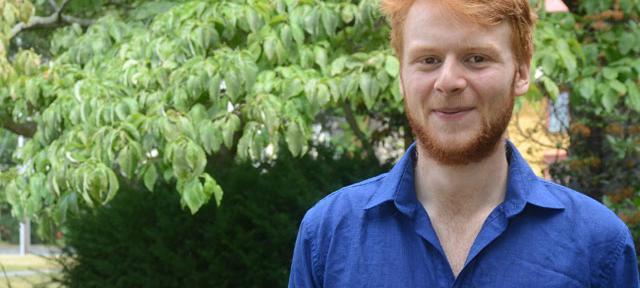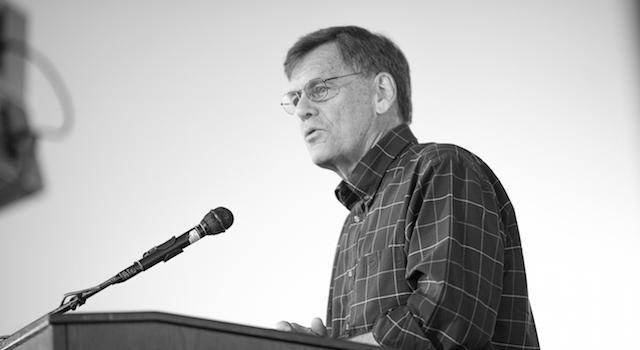Division III Profile: Joslyn Studies the Philosophy of Abolitionist Frederick Douglass

Daniel Joslyn’s Division III thesis project provided an intriguing perspective on the life of the American activist and statesman Frederick Douglass, who was born into slavery and became a leading voice in the abolitionist and human rights movements. In 1945 Douglass published his autobiography, Narrative of the Life of Frederick Douglass, considered a quintessential document of American history. In a thesis entitled, “Frederick Douglass’s Poetry, Prophecy, and Perfectionism, 1880–1895,” Joslyn reexamined his speeches and writings from a new standpoint.
“Douglass isn’t generally seen as a philosopher, only as an orator—philosophy is thought to be written, not spoken,” Joslyn says. “I wanted to see what would happen if I looked at Douglass as a philosopher and theologian, taking his speeches and looking at them as collections of philosophies.”
By reading Douglass’s speeches, essays, and letters from the last 15 years of his life, Joslyn discovered that Douglass as philosopher had a unique concept of God. “According to Douglass, God is the unification of all truth in the world, and the goal of life is to become more God-like—more true and less untrue,” he says. “God is unlimited, and the height of heaven is unreachable and unlimited, and the pit of hell is unlimited. If you go up, you can go unlimitedly upward—if you go downward, you can go unlimitedly downward.”
The project required an intensive study of religion and philosophy, from the Bible to Plato, in order to understand Douglass’s diverse intellectual influences. “It was incredibly hard to study him,” Joslyn says. “Most of what he’s saying is rooted in many different literatures of the world. He was so well read—he had two thousand books in his library; he was just brilliant. The most interesting element was how incredibly complex and diverse his thought was, and trying to trace that back by reading.”
Recently retired professor of history Susan Tracy was chair of Joslyn’s faculty committee, working with Associate Professor of American Literature and Jewish Studies Rachel Rubinstein. Tracy observes that Douglass is typically thought to have been a more radical thinker in his youth, becoming more conservative as he aged. But Joslyn’s research revealed a more consistent Douglass, one who Tracy says was “slightly more conservative and religious than I had imagined him to be, but not out of step with other liberals of his time.”
Tracy praises Joslyn for his “ingenuity and diligence,” adding, “I’ve rarely worked on a Division III or a senior thesis anywhere that’s so meticulously researched. In historian’s terms, Daniel has mastered both the secondary and the primary sources and produced work that’s rare even at the beginning graduate level.”
Joslyn will attend graduate school at NYU this fall, one of three students awarded the Berger-MacCracken Fellowship there. He plans to study 19th-century American history, with a secondary emphasis on transnational history.



